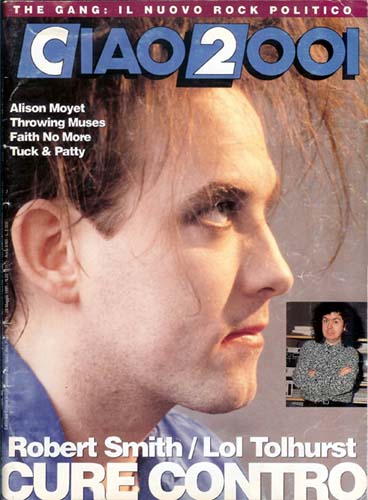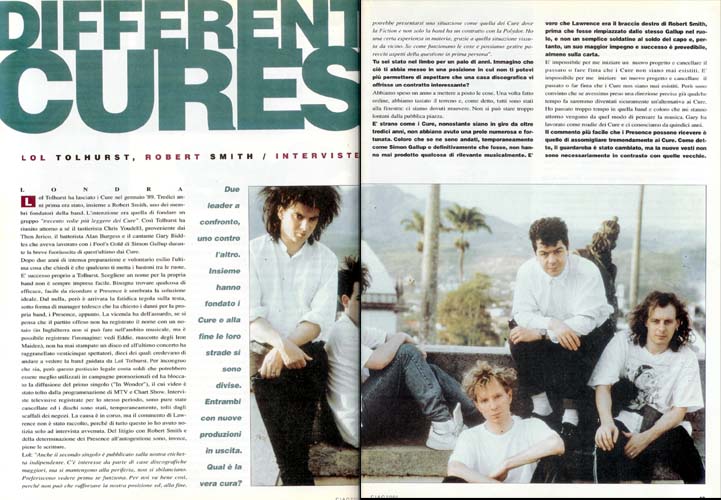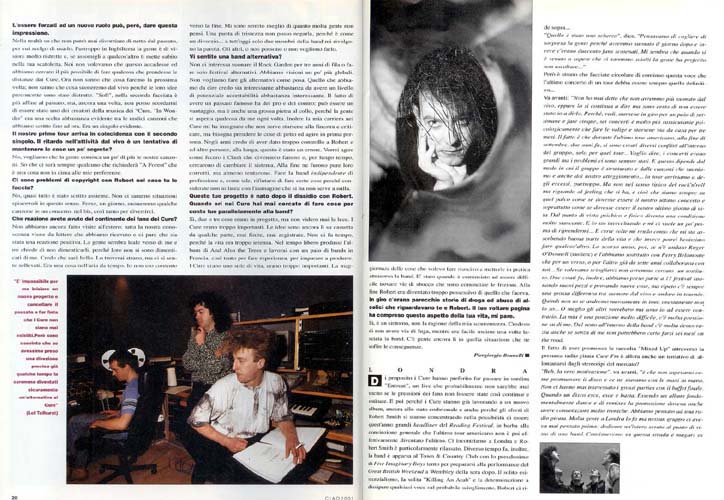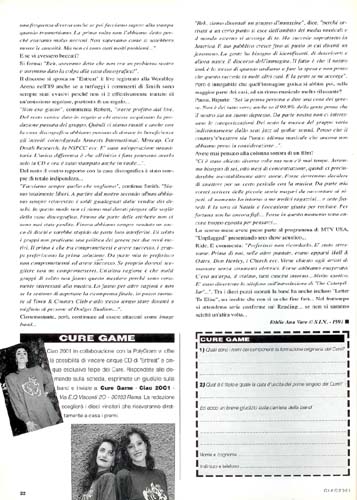"Different Cures"




May
1991
- Ciao2001 -
(Italy)*
(Translation below)
"Different Cures"




Different Cures
Two leaders, one against the other. Together they founded The Cure and in the
end they went their separate ways. Both have new releases. Which one is the real
cure?
LONDON
Lol Tolhurst left The Cure in January 1989. Thirteen years before he had been
one of the founders of the band. He wanted to found a band that was "300 times
lighter than The Cure." So Tolhurst gathered keyboardist Chris Youdell from Then
Jerico, drummer Alan Burgess and singer Gary Biddles, who had been in Fools
Dance, the band Simon Gallup formed during his short leave from The Cure.
After two years of hard work and voluntary exile, the last thing you need is
someone putting a spoke in your wheel. That's what happened to Tolhurst.
Choosing a name for your band isn't always easy. You have to find something
good, easy to remember and Presence seemed like the ideal solution. Then, out of
the blue, comes the blow, in the form of a German manager who claimed damages
for his band, Presence. The story sounds preposterous, given that the plaintiff
didn't register its name (in Great Britain you can't do it in the musical field,
but you can register an image: see Eddie, Iron Maiden's mascot), never published
an album and at its last concert scraped together twenty-five people, ten of
whom thought they were going to see Tolhurst's band. It may be incongruous, but
this legal trouble has cost money that could be better spent in promotion and
put off the release of the first single ("In Wonder"), whose video was removed
from MTV and from Chart Show programme schedules. TV interviews that had already
been recorded were also cancelled and records were temporary removed from shop
shelves. The case is being argued , but we don't have Lawrence's comment on
this, because I discovered it only after interviewing him. On his quarrel with
Robert Smith and the choice towards self-management for Presence, though,
there's much to write.
Lol: "Our second single was published by our independent company. Majors are
interested, but they haven't made a move yet. They want to see if things work
before making an offer. That's OK with us, it can only strengthen our position
and, in the end, we could have the same thing that happened with The Cure, were
also Fiction, and not only the band, has a contract with Polydor. I have some
experience in the matter, I lived that situation myself. I know how things work
and I can manage a lot of this stuff myself."
You were in a limbo for a couple of years. I suppose you came to a point when
you couldn't afford to keep waiting for a record company to offer you an
interesting contract?
Lol: "We spent a year getting things straight. Once we were done, we looked
around and, as I've already said, no one made the first move; we had to do it
ourselves. You can't stay out of the limelight for too long."
It's strange how The Cure, despite having been around for 13 years, don't have a
numerous and lucky offspring. Those who left, either temporarily like Simon
Gallup or permanently, have never produced anything outstanding. It's true that
Lawrence used to be Robert Smith's right-hand man before being replaced by
Gallup in that role, he wasn't just another toy soldier, so a bigger effort and
success are to be expected, at least on paper.
Lol: "For me it's impossible to start a new project and erase the past or
pretend The Cure never happened. But I'm sure that if we had taken a definite
direction some time ago, we may have been an alternative to The Cure. I was in
that band for too long and those who are close to me have the same attitude
towards music. Gary worked as Cure roadie and we've known each other for fifteen
years."
The easiest comment Presence may get is that they sound terribly like The Cure.
There's a new wardrobe, but the new clothes aren't necessarily colliding with
the old ones. Being forced into a new role may give this impression, though.
Lol: "I know I'll never be able to break with the past, so I chose to use it.
Unfortunately in Britain people are very narrow minded and, if you sound like
someone else, you get labeled. We didn't want this to happen and we tried to do
something completely different from The Cure. Now they don't know what we're
going to do next time; they don't know what we're going to play live because
their preconceived ideas have been destroyed. "Soft" is closer to the past, but
once again, I can't forget I was one of the creators of the music of The Cure.
"In wonder" was quite an understandable choice among the eleven songs we wrote
so far. It was an obvious single."
Your first tour comes at the same time as your second single. The delay in live
activity is a coincidence or is it an attempt to keep things secret?
Lol: "No, we want people to know our songs. I know there will always be someone
asking "A forest" and I'm not thrilled at the idea."
Will there be copyright problems with Robert if you do?
Lol: "No, we wrote nearly everything together. There will be no unpleasant
situations. Maybe someday we'll play some songs live in the encore, just for
fun."
What have been the reactions from Cure fans?
Lol: "We haven't gone abroad yet; all we know comes from letters we get and we
think the reaction was quite positive. People seems loyal towards me and ask me
not to forget them, because they didn't forget me. I think it's going to be
good. You might find it odd, but it makes you feel relieved. It's been in the
air for a long time. I wasn't happy towards the end. Now I feel better than
people may think. I can't deny there was a bit of sadness, it's like a
divorce... As of today, only two members of the band talk to me, the others
can't or don't want to."
Do you consider yourselves an alternative band?
Lol: "We don't want to play Rock Garden for three years or do only alternative
festivals. Our horizons are broader. We don't want to be alternative per se.
What we have to say is interesting enough to reach a potentially bigger
audience. Having a famous past has pros and cons: it can be an advantage, but
it's also hampering, because people always expect something from me. Besides, my
carrier with The Cure taught me to face up to things and act. In the past I gave
up control to Robert and other people too often and that was a mistake. I'd like
to do like The Clash, who became famous and then tried to change the system. In
the end they gave up, but at least they tried. Being a "professionally
independent" band and, as such, refusing to do certain things because they don't
fit your image is useless."
This project was born after your split with Robert. Did you try to do things on
your own when you were in The Cure?
Lol: "Yes, there were a few things in the air, but they never saw the light of
day. The Cure were too important. The ideas are still somewhere on tape, never
finished, never published. There wasn't enough time, because life was too
intense. In my free time I produced the And Also the Trees album and I worked
with a couple of bands in France, just to make experience, to learn how to
produce. The Cure were a lifestyle, they were too important. I managed to
accomplish most of the things I wanted to do through the band. When finding ways
to express myself started to get difficult, then the contrasts began. In the end
Robert was too possessive towards what he was doing."
There were a lot of rumors about drugs and alcohol abuse concerning you and
Robert. Your turning over a new leaf involves this part of your life too, it
seems.
Lol: "Yes, it's a symptom, not the cause of my unhappiness. I thought I had no
way out, but it was easy to get out after leaving the band. Some people are
still in that situation and taking the consequences."
LONDON
The Cure decided not to promote much "Entreat", a live album that probably
wouldn't have been released if requests from the fans hadn't been so strong and
insistent. Because The Cure are already working on a new album, still at an
early stage, and because Robert Smith is very focused on the possibility of
being one of the headliners at Reading Festival this year, much to the general
belief that the last American tour wasn't really the last one in the end. We
meet in London and Robert Smith is definitely relaxed. Some time ago the band
played at the Town & Country Club under the name of Five Imaginary Boys, to warm
up for the Great British Weekend performance at Wembley Arena the following
night. The usual existentialism, the usual "Killing an Arab" and the
determination to erase any rumor about a possible split. Robert laughs about it.
Robert: "That was a joke" he says. "We thought we'd take people by surprise
because we were going to play the next day, but there were two hundreds crazy
fans instead. It seems that when people heard we were about to call it quits,
they chose not to listen..."
But it's strange to keep saying that the last concert of a tour must be "the"
last one.
Roberts continues: "I've never said we would never play again, people keep
saying it, but I wasn't the one who said it. Because, you know, being around for
a couple of weeks and playing five, six concerts, it's much easier than packing
up and staying away from home for three months. The thing is, during the last
American tour, at the end of September of two years ago, a lot of conflicts
within the band came up, just for that tour... I mean, the concerts were great,
but we always had problems. And that depends on the way the group is structured
and on the song we play and on our attitude as well... When we tour we always
reach extremes. Not in the typical rock'n'roll sense, but concerning feelings,
we're always on that stage as if that was our last concert and our last day of
life. On a psychological as well as physical level it becomes a distressful
situation. And I'm getting old and I need time to get over it... And sometimes I
realize all this is sucking most of my life away, when I could be doing
something else instead. Last year Roger O'Donnell (keyboards) left, and we
replaced him with Perry Bamonte who, in a way or another, has been working with
us for seven years. If we had wanted to call it quits, we wouldn't have looked
for a substitute. Two summers ago we played in 17 festivals, trying out new
songs and new things, but, I repeat, there's a big difference between playing
live and going on tour. So I don't know if we're going on tour again, I really
don't know... Or if the other would and I'm the only one against it. My position
is a difficult one, there's a lot of pressure around me. The band is democratic
after all, even if without me they could never go on tour for six months of
course."
Promoting "Mixed Up" through the Cure FM pirate radio was an attempt to get away
from mainstream stereotypes?
Robert: "Well, the real reason is that we didn't know how to promote the album
and we were twiddling our thumbs. We've never been interested in big parties
with final buffet. When we release an album, it's out and that's it. Since it
was basically a dance and remixes album, the promotion had to be kind of ironic.
We thought of a pirate radio. Many people in London had thought of it before:
dedicating a whole night to a single band. We're going to continue the sane way,
maybe on a difference frequency, but we always let the press know when we're
broadcasting. The first time we didn't tell anyone because we were nervous. We
didn't know how the authorities would react. But we didn't have any problem..."
And what if you had?
Robert pauses. "Well, we would have said it wasn't our problem and put the blame
on our recording company!"
We talk about "Entreat", the live album that was recorded at Wembley Arena in
1989, even if so far Smith's comments on it have been vague, because it wasn't a
real release, but rather a gift...
Robert: "Exploiting the live CD wouldn't be fair. In the end it was a bonus CD
for those who bought already released CDs of the band. So we met up with the
recording company and decided to devote the proceeds to charity, drawing in
Amnesty International, Mencap, Cot Death Research, NSPCC and so on. It was a
humanitarian task. The only difference was that in the beginning it was only on
CD, while now it's on vinyl too."
Your relationship with your recording company has always been has always allowed
you total independence...
Robert: "We always do whatever we want. We're totally free. From our second
album on, we've always reinvested the money we earned. This way we've never had
to bow our head to the recording company. There haven't been any losses so far.
We've always sold a lot of albums and it would be stupid of them to interfere.
Bands usually don't act like this for two simple reasons. First of all, between
taking compromises and being successful, bands usually choose the former.
Personally, I prefer not to take compromises and be successful. If I had to
choose, I wouldn't take compromises. Another reason is that many bands aren't
really interested in making music. They're in it for a series of reasons and
don't want to wait for the final recompense. I can play at the Town & Country
Club and face thousands of people at Dodger Stadium at the same time..."
Nonetheless you're still labeled as an "image band"...
Robert: "Well, we've become an image band because at one point you get beyond
the musical field and the world notices you. This happens especially in the USA.
Your audience grows so much and turns into a phenomenon. People need to identify
and pinpoint you and your image plays a crucial role. The thing is, out look is
the same when we do the shopping and I don't thing that's very common. And
people notice."
But you can't deny that your gothic image is very often combined with a very
relaxing rhythm.
Robert: "You're the first to say something like that. It's not quite true, even
if 99.9% of the people think our sound is depressing. We're not really
interested in categorizations. The band's music goes from scat jazz to gothic
sound. I think country'n'western is the only genre we haven't taken into
consideration yet..."
Have you ever thought of writing a film soundtrack?
Robert: "We've been asked a few times, but we never have time. We'd need six or
eight months to do it and we would have to give up something else. Maybe we
should just stop making music for a while. I would like to write short stories,
mainly for my nephews and nieces, I'm surrounded by thirteen children at the
moment... and seven siblings. And Christmas Eve is the perfect opportunity to
play. Luckily I still don't have children of my own... Perhaps I'm too selfish
at the moment..."
Last month you played MTV USA "Unplugged" with an acoustic show...
Robert laughs. "I'd like to forget it. It was stressful. Before us other bands
had performed: Hall & Oates, Don Henley, Church... You have to play without
electric instruments. Maybe we exaggerated. There was a harp, a violin, cushions
all around... Very exotic. The xylophone in The Caterpillar intro was fun."
Among the ten songs the band performed there was "A Letter to Elise", an
unreleased track that may or may not be used in the future. In the
meantime we're waiting for a confirmation for Reading... If they don't call it
quits again...
THANKS
to: Alex for
the TRANSLATION.